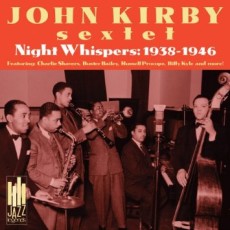
Daily Dose Of Jazz…
John Kirby was born John Kirk in Winchester, Virginia on December 31, 1908. His mother gave him up for adoption and was raised by Reverend Washington and Nancy Johnson. He was a student at the Winchester Colored School and started trombone lessons around nine years old under the guidance of Professor Powell Gibson. As a kid and that he learned to play music just as it was written and his formal education ended around 1923.
Kirby arrived in Baltimore around 1927 and met trombonist Jimmy Harrison, saxophonist Coleman Hawkins and composer Duke Ellington. It was Harrison who persuaded him to switch from trombone to tuba. He played tuba with Bill Brown and His Brownies, pianist Charlie Sheets and then with John C. Smith’s Society Band. He joined Fletcher Henderson in 1929, recorded tuba on a number of sessions, but switched to double-bass when tuba fell out of favor as jazz bands’ primary bass instrument.
In the early 1930s, John took bass lessons from legendary bassists Pops Foster and Wellman Braud, left Henderson to play with Chick Webb, then joined Lucky Millinder and briefly led a quartet in 1935, but was more often than not a sideman in other groups. He performed behind Billie Holiday and Teddy Wilson on their first recording date.
By 1936, Kirby was a successful sideman on the New York City jazz scene, secured a gig at the Onyx Club leading Charlie Shavers, Buster Bailey, Billy Kyle, Russell Procope and O’Neill Spencer, becoming one of the more significant small groups in the big band era. They recorded the Shaver’s classic Undecided, with Maxine Sullivan most often performing the vocal duties for the group.
Along with his orchestra, John had a 30-minute radio program, Flow Gently, Sweet Rhythm, also known as The John Kirby Show on CBS from April 1940 – January 1941. The program also featured Sullivan and the Golden Gate Quartet and they have been cited as the first black artists to host a jazz-oriented series.
He tended toward a lighter, classically influenced style of jazz often referred to as chamber jazz. He was very prolific and extremely popular from 1938-1941 but lost most of his group to World War II. Through the war years he was able to attract Dizzy Gillespie, Benny Carter, Ben Webster, Clyde Hart, Budd Johnson and Zutty Singleton to his small groups and club dates. As Kirby’s career declined, he drank heavily and was beset by diabetes.
After the war, Kirby got the surviving sextet members back together, with vocalist Sarah Vaughan but the reunion did not last. A concert at Carnegie Hall in December 1950, with Bailey plus drummer Sid Catlett, attracted only a small audience, crushing his spirit and badly damaging what little was left of his career. Double-bassist, trombonist and tubist John Kirby passed away on June 14, 1952 in Hollywood, California at age 43.


